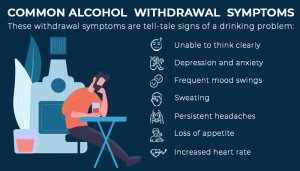Alcohol withdrawal occurs when your body becomes dependent on alcohol; you either stop drinking or drastically minimize your alcohol intakes. In some cases, alcohol withdrawal is mild; in some scenarios, it can be severe and potentially lethal. Alcohol is a central nervous system depressant (CNS), inhibiting brain function.
The body adapts to the depressant effect of alcohol over time. When you drink less or stop drinking, your central nervous system (CNS) gets too excited, which can cause withdrawal symptoms.

What Are The Withdrawal Symptoms of Alcohol?
Alcohol withdrawal symptoms can range from mild to severe. People who have been drinking heavily for a long time usually have more severe symptoms. Symptoms usually improve after about a week. However, these symptoms may last longer for some people.
Initial Signs And Symptoms
The first symptoms may appear several hours after your last drink, and they may include the following:
- Tremors make it difficult to sleep (insomnia)
- nauseousness or vomiting
- feeling on edge or anxiously restless
- headache \ sweating
These may be the only signs of alcoholism in people who aren’t as dependent on it.
Symptoms typically worsen after they first appear. They usually go away within a day or two.
More Severe Symptoms
People who are severely addicted to alcohol may experience more severe symptoms.
Hallucinations
Hallucinations can manifest as:
visual, auditory, and tactile (touch)
They frequently appear within 24 hours of your last drink.
Seizures Due To Withdrawal
These seizures are widespread and, like hallucinations, frequently appear within 24 hours of your last drink.
Epileptic Status
About 3% of those with seizures may have a more serious type known as status epilepticus. A medical emergency like this can result in disability or death.
Tremendous Delirium
The worst sign of alcohol withdrawal is delirium tremens, which can be fatal. It usually happens two to three days after your last drink. Among the symptoms are:
feeling disoriented or perplexed
experiencing hallucinations
high heart rate
increased rate of breathing
blood pressure that is too high (hypertension)
low-grade fever and excessive sweating
agitation, stupor, loss of consciousness
Death from delirium tremens is uncommon with early treatment and prevention.
How is Withdrawal Identified?
There are no specific alcohol withdrawal tests. Instead, your doctor will use a thorough medical history and physical examination to diagnose and assess the severity of your withdrawal symptoms.
They may ask you the following questions when taking your medical history:
how long you’ve been drinking
your level of alcohol consumption
how long has it been since you last drank alcohol
If you have previously experienced alcohol withdrawal,
and whether you have any other underlying medical or psychiatric conditions.
Because of its stigma, discussing heavy alcohol use can be difficult. Still, it is critical to be open and honest with your doctor.
Knowing all of the facts helps them figure out how to treat you and how bad your condition is. This knowledge will only benefit you in the long run.
Heavy or prolonged alcohol use can harm many parts of your body, including your heart, liver, and nervous system. Your doctor may also order blood tests to look for signs of alcohol-related damage in these areas.
How Is Alcohol Use Disorder Detected?
Your doctor can take several steps to diagnose alcohol use disorder. They may include the following:
- Personal and medical history. Your doctor will request a detailed assessment of your drinking habits.
- Physical examination. This may include laboratory tests to assess your overall health and look for signs of heavy or prolonged alcohol use.
- Psychological evaluation. This assessment can provide additional insight into your thoughts and behaviors. The new edition of the Diagnostic and Statistical Manual of Mental Disorders (DSM-5) is used by your doctor to assist in diagnosing.
Managing Alcohol Addiction
Treatment for alcohol withdrawal includes both supportive care and medication.
Assistive Care
Supportive care may include the following:
drinking enough fluids to stay hydrated, maintaining electrolyte balance, consuming missing nutrients such as folate thiamine
Dextrose
The Food and Drug Administration (FDA) has approved three medications for the treatment of alcoholism.
They are not addictive and will not replace alcohol consumption. Rather, they are designed the same way as any other medication to treat a chronic medical condition.
Here’s A Quick Recap:
Acamprosate helps reduce or stop the symptoms of alcohol withdrawal that happen when someone stops drinking.
When combined with alcohol, disulfiram causes unpleasant side effects such as nausea.
Naltrexone reduces alcohol cravings by blocking specific receptors in the brain.
For many years, benzodiazepines were the primary drugs used to treat alcohol withdrawal. These are sedative medications, and they can help with withdrawal symptoms and prevent seizures and delirium tremens. Here are some examples:
diazepam (Valium) (Valium)
lorazepam (Ativan) (Ativan)
chlordiazepoxide (Librium) (Librium)
Benzodiazepines are the most common drugs used to treat alcohol withdrawal, but your doctor may also give you other drugs. Clonidine (Catapres) and haloperidol are examples of such medications (Haldol).
The Significance of A Secure Withdrawal
Depending on how dependent you are on alcohol, the withdrawal symptoms can be very bad or even kill you. That is why it is critical to managing your withdrawal safely.
Alcohol withdrawal under supervision is the most secure. Withdrawal from alcohol that is mild to moderate can be treated in an outpatient setting, but the person needs to be checked on every day. People with more serious symptoms should be treated in a hospital, where medical professionals can closely watch their health.
If you or someone you know is abusing alcohol, seek medical attention before discontinuing use. They can evaluate your condition and advise you whether to complete your withdrawal in an inpatient or outpatient setting.
Your doctor can also talk about the symptoms you’re having and the medications they might prescribe to help you feel better. Following withdrawal, your doctor can also provide you with resources and tools to assist you in remaining alcohol-free.
